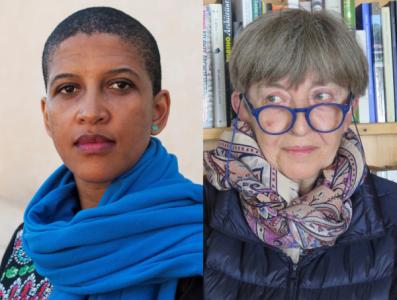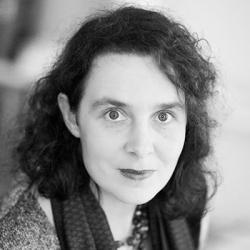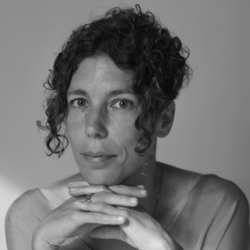Lerato Shadi & Adriana Cavarero. La voix dans sa singularité / The singularity of the voice
Atelier de recherche
Lerato Shadi & Adriana Cavarero. La voix dans sa singularité / The singularity of the voice
Septième séance du séminaire « Comment exposer la polyphonie ? » avec l’artiste Lerato Shadi et la philosophe Adriana Cavarero
Cette rencontre entre l’artiste Lerato Shadi et la philosophe Adriana Cavarero, accompagnée par Daniele Balit (ISBA, Besançon), Lorenzo Bernini (Università di Verona) et Katja Gentric (ESADHaR, Rouen), fait partie du séminaire « Comment exposer la polyphonie ? ». Organisé depuis mars 2021 au DFK Paris par Mathilde Arnoux (directrice de recherche au DFK Paris) et Anne Zeitz (maître de conférences en Arts plastiques à l’Université Rennes 2), ce séminaire accompagne l’élaboration conceptuelle et théorique de l’exposition « Polyphon(e). Polyphonies visuelles et sonores / Mehrstimmigkeit in Bild und Ton ». Quatre premières séances avaient précédé l’inauguration de l’exposition à Gera (Museum für Angewandte Kunst et Kunstsammlung Gera – Orangerie, 2 juillet au 19 septembre 2021). Pour l’ouverture du deuxième volet à Saint-Denis (Musée d’art et d’histoire Paul Éluard, 20 mai au 7 novembre 2022), nous poursuivons la réflexion à travers de nouvelles rencontres avec artistes et théoriciens.
Aux prises avec les développements sociaux nés de la décolonisation, notamment dans le contexte sud-africain, Lerato Shadi questionne les manières de donner à entendre sa voix. Face à la violence du langage, elle s’intéresse à comment traduire et raconter l’irracontable, comment envisager un rapport avec une histoire marquée par la stigmatisation et l’oppression. À travers installations, performances, vidéos et textes, la voix s’expose et se dérobe à la fois, elle est singulière tout en créant ce que Katja Gentric a intitulé un « polylogue » et qui se situe au seuil de l’intelligible.
Les écrits majeurs de la philosophe Adriana Cavarero se concentrent sur les phénomènes vocaux incarnés et non-sémantiques. Elle propose une « politique de la voix » à travers une relecture de l’histoire de la philosophie qui prête une attention particulière aux voix féminines dans la mythologie grecque. Par-delà la transmission de contenu, la voix y est envisagée comme porteuse de singularité et de signification. De son dernier ouvrage Surging Democracy ressort la définition d’un son particulier de la pluralité, un « bruissement pluriphonique » (pluriphonic rustle). Celui-ci caractérise la sonorité particulière de la pluralité des expressions vocales au sein de foules – qu’elle distingue des masses – et des liens qu’elles entretiennent lors de rassemblements. À partir de ces réflexions, Adriana Cavarero propose une histoire alternative, voire une contre-histoire de la voix dans ses rapports sociaux-politiques et philosophiques en pointant le caractère unique de celui qui la fait résonner.
Pour plus d’informations sur Lerato Shadi, voir le site de l’artiste (www.leratoshadi.art) ; pour Adriana Cavarero, voir le site de l’université de Vérone (www.dsu.univr.it).
- Inscription au workshop demandée par mail à marnoux@dfk-paris.org ou anne.zeitz@univ-rennes2.fr.
- Écouter les archives sonores du séminaire sur le site de la radio expérimentale ∏-node : https://p-node.org/broadcasts/polyphon.
English:
Seventh workshop of the seminar “Exhibiting Polyphony” with artist Lerato Shadi and the philosopher Adriana Cavarero
The encounter between artist Lerato Shadi and philosopher Adriana Cavarero, accompagnied by Daniele Balit (ISBA, Besançon), Lorenzo Bernini (Università di Verona) and Katja Gentric (ESADHaR, Rouen), is part of the seminar “Exhibiting Polyphony”. Organised since March 2021 at the DFK Paris by Mathilde Arnoux (research director at the DFK Paris) and Anne Zeitz (lecturer in Visual Arts at Université Rennes 2), this seminar accompanies the conceptual and theoretical formulation of the exhibition “Polyphon(e). Polyphonies visuelles et sonores / Mehrstimmigkeit in Bild und Ton”. Four workshops preceded the opening of the exhibition in Gera (Museum für Angewandte Kunst and Kunstsammlung Gera – Orangerie, 2 July to 19 September 2021). For the opening of the second part in Saint-Denis (Musée d’art et d’histoire Paul Éluard, 20 May to 7 November 2022), we are continuing the reflection through new encounters with artists and theoreticians.
Involved with the social developments that have arisen from decolonisation, particularly in the context of South Africa, Lerato Shadi questions the ways to make her voice heard. Faced with the violence of language, she is concerned by how to express and narrate the indescribable, how to envisage a relationship with a history marked by stigmatisation and oppression. Using installations, performances, videos and texts, the voice in Shadi’s work is both exposed and concealed. It is singular. It creates what Katja Gentric has called a “polylogue” and which exists at the threshold of intelligibility (further information on the artist’s website, www.leratoshadi.art).
The major writings of the philosopher Adriana Cavarero focus on embodied, non-semantic vocal phenomena. She presents a “politics of the voice” through a reinterpretation of the history of philosophy, in which she pays particular attention to female figures in Greek mythology. Going beyond the idea of the voice as the means for transmitting content, its sound and texture is considered a bearer of singularity and meaning. Her latest book publication Surging Democracy offers the definition of a particular sound of plurality, a “pluriphonic rustle”, which refers to the sound of the plurality of vocal expressions in crowds – which she distinguishes from the masses – and the connections they maintain during gatherings. Taking these reflections as her starting point, Cavarero presents an alternative history, or even counter-history, of the voice in its social-political and philosophical relations, while drawing attention to the uniqueness of the individual to whom it belongs.
For more information on Lerato Shadi, see the artist’s website (www.leratoshadi.art); for Adriana Cavarero, see the website of Università di Verona (www.dsu.univr.it).
- Workshop registration requested by mail to marnoux@dfk-paris.org or anne.zeitz@univ-rennes2.fr.
- Listen to the sound archives of the seminar on the website of experimental radio ∏-node: https://p-node.org/broadcasts/polyphon.
Collègue(s) du DFK Paris impliqué·e(s)






